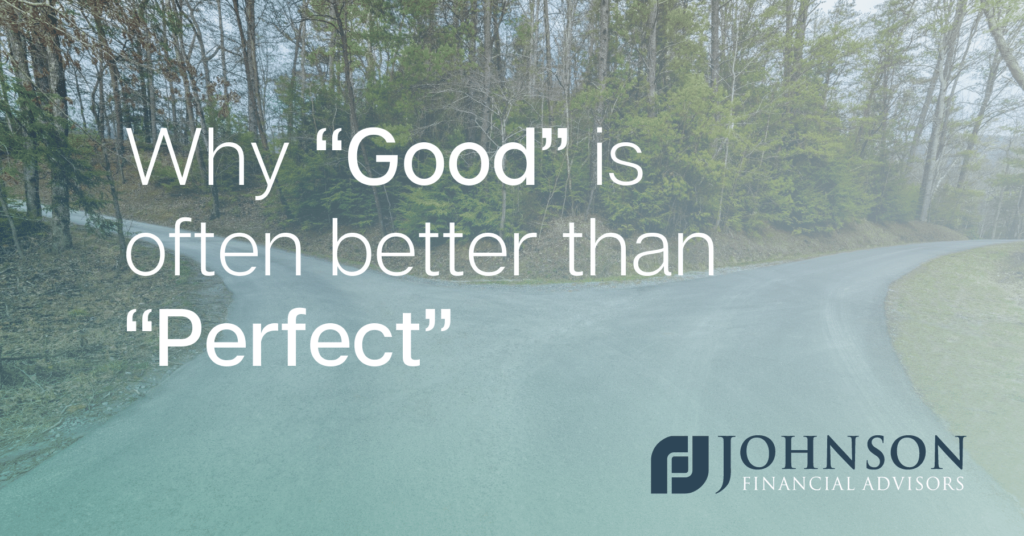
Why “Good” is often better than “Perfect”
Seeking for perfection is embedded in the human psyche. We’ve been taught that “good enough” isn’t good enough. But striving for perfection in ourselves and others can be crippling, stressful, and often results in unhappiness. Brain studies back this up. Trying to be perfect overwhelms your brain with emotions and makes you feel out of control.

Some decisions, such as marriage and career choices, require a great deal of thought and contemplation. But 99% of life’s decisions need to be made in a timely manner with less-than-perfect-information:
- Should I put money into the stock market?
- Should I take money out of the stock market?
- Do I need to refinance my mortgage?
- Should I give money to my kids?
- Which cellphone plan works for me?
- Should I get a new car, or wait a year?
- Which charity should I donate to?
- Am I ready to set up a trust?
- Should I retire early?
- Where should we go on vacation?
- Should I move or should I remodel?
- Which medical plan is best?
- And of course, the daily decision, “What’s for dinner?”
Psychologist Barry Schwartz, author of “The Paradox of Choice: Why More Is Less,” notes that the wide array of options available in today’s world makes us less happy, not more. This “choice overload” makes us question our decisions and sets our expectations too high.
Schwartz gives this advice: “If you aren’t sure if you attended the very best party or bought the very best computer, just settle for ‘good enough.’ People who do this are called ‘satisfiers,’ and they’re consistently happier than the ‘maximizers,’ people who feel that they must choose the very best possible option.”
Schwartz points out that ‘maximizers’ usually have higher incomes, but they are often unhappy at work and are more likely to be depressed in general. This happens because as life circumstances improve, expectations rise. Lower quality items that used to be perfectly fine are no longer good enough. “People end up just running in place,” he says. “Their income goes up, but so does their appetite for nicer things. It’s an endless cycle.”
But if you can settle for something that’s acceptable—even if you know there is something better out there, you are more likely to feel satisfied and happy.
His recommendation for high schoolers and their parents? Consider five colleges, not 25. By limiting the number of choices you have in a decision, you will make things easier on yourself. Do you really need to spend five weeks to research which laptop to buy? Or can you spend five minutes calling a knowledgeable friend and get his recommendation?

One of our favorite decision-making guidelines is the 80% Rule. This rule works because 80% is close enough to 100% to convey the idea of striving for excellence without requiring absolute perfection. Sometimes we have to choose between two good things—and there is not one option that is 100% perfect. One of the beauties of the 80% Rule is that it respects and acknowledges the exceptions. For instance, 80% of the time, you will find that the 80% Rule works extraordinarily well!
Investors can never be 100% right. Financial plans are never 100% accurate. And life does not go 100% according to plan. However, by regularly making the best decision you can with the information you have, you will see amazing results over time, even with mistakes. The greatest threat to financial success, or any other success in life, is being paralyzed by fear that you might not make the perfect choice.
